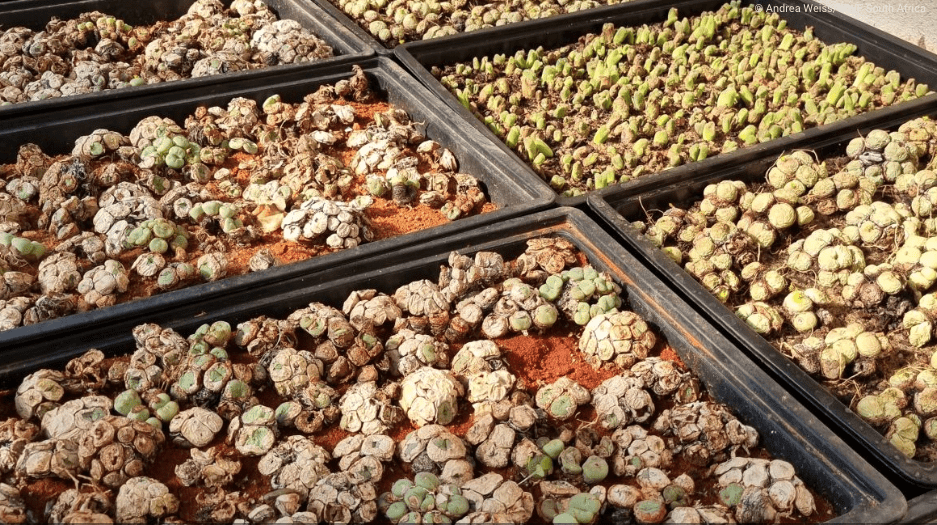
Succulent cases accounted for 40% of the total cases registered in the Western Cape in 2020-2021. Photo courtesy of WWF.
According to Cape Nature, illegal trade in succulents remains the most widespread wildlife crime in the Western Cape, with most plants destined for the illegal trade in East Asia, where they are sold to collectors and nurseries.
The province is home to over 52% of South Africa's plant species, many of which are endemic to the Western Cape, meaning they occur naturally nowhere else on earth.
“This makes the area an attractive destination for criminals engaging in the illegal trafficking and trade of succulents,” said Cape Nature, the lead custodian of the Cape's natural environment and under the Western Cape Nature Conservation Board.
According to Cape Nature, more than 1.2 million wild-collected plants representing 650 species have been seized in the past four years. “Law enforcement and reporting of illegal collection provides valuable information, but it is estimated that less than 25% of the trade is stopped by enforcement officers.”
If entire plants are removed at a rate faster than populations can recover, it becomes unsustainable.
“Any harvest for traditional uses must take into account whether natural populations are capable of sustaining such harvest and require an understanding of the natural ecosystem of the plants being harvested,” the group said.
This means knowing how long a plant species will survive, how old a plant needs to be to reproduce, what a species needs to reproduce, whether it is dependent on pollinators or climate conditions, etc. “For example, removing all mature plants from a population is not sustainable.”
Cape Nature's 2023 State of Biodiversity report notes that the most significant trend that emerged during the reporting period was the increase in cases of illegal trafficking of succulents, which it attributes to a change in activity from foreign individuals collecting for “selfish gain” to organised syndicates recruiting local residents to collect succulents for the international market.
“The succulents are collected locally, packaged and transported to Cape Town or Gauteng for export using existing smuggling networks. Evidence collected during investigations indicates that most of the succulents are destined for the Chinese market,” the report said, noting that South African succulents are regularly sold on online marketplaces and social media platforms.
“The second trend identified in the enforcement action data indicates that the number of J534 fines issued during the reporting period has decreased. At the same time, the number of registered case records has increased.”
The downward trend comes at a time when there has been a “dramatic increase” in illegal trade in succulents: “These trafficking cases are often too serious to issue on the spot fines and require a registered incident record.”
Poaching of succulents on the rise
The report found that there was a significant increase in cases of poaching and trafficking of succulents during the reporting period. In 2018-19, cases of trafficking of succulents accounted for 4 per cent of all registered cases, and in 2019-20, they accounted for 20 per cent of all registered cases.
However, in 2020-21, succulent cases accounted for 40% of the total cases registered in the Western Cape. This trend continued in 2021-22, with succulent cases making up 54% of the total cases registered in that year. In 2022-23, succulent cases accounted for 38% of the total cases registered.
Globally, wildlife crime is considered to be the second greatest threat to species extinction after environmental destruction. Wildlife trade consists of the sale and exchange of wild animals and plants, animal and plant parts and derivatives, and processed products such as carved ivory.
These species of plants and animals that are endangered due to the wildlife trade are protected by various laws at state, national and international levels. “If these laws are breached, trading plants or animals without a license becomes a wildlife crime.”
Cape Nature added that the shocking statistics on succulent poaching “shine a dark light” at the illegal activity, which could ultimately lead to the disappearance of the state's rich biodiversity.
Combating illegal collection and trade requires a holistic approach to raising public awareness about the importance of biodiversity, including working with local communities, naturopaths and other groups that use wild-collected plants, the report says.
Integrated response
CapeNature partners with other agencies involved in the fight against succulent poaching. One outcome of these partnerships has been the development of a national strategy to combat succulent poaching.
Funded by the WWF Land Programme, we partnered with WWF South Africa and the Leslie Hill Succulent Karoo Trust to deliver the project as part of a comprehensive response to tackle illegal trade in succulents and serious wildlife crime.
“The project is part of the WWF-SA Land Programme's integrated response to tackle the illegal trade in succulents,” the organisation said. “It is aligned with the priorities recently established in the National Response Strategy and Action Plan to tackle the illegal trade in succulents, as well as the objectives of the Leslie Hill Succulent Karoo Trust.”
“This response will safeguard the significant investment that Cape Nature and the WWF-SA/Leslie Hill Succulent Karoo Trust are making in protected areas to conserve succulent species, and will also help conserve species outside of current formally protected areas.”
One of the project's aims is to work to improve the enforcement capacity of existing laws on wildlife crime, a mandate of CapeNature, the conservation management agency within the Western Cape.
He added that the purpose-built facility has improved knowledge exchange between players including the South African Police Service, the National Prosecuting Authority, the Department of Forestry, Fisheries and Environment and local communities, “strengthening collaboration, enhancing information sharing and sustaining partnerships to effectively tackle wildlife crime”.

